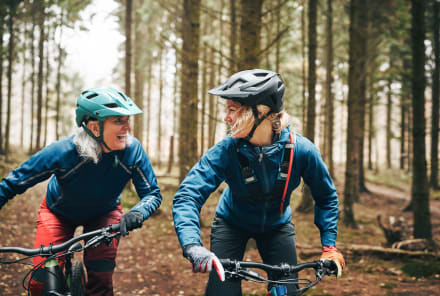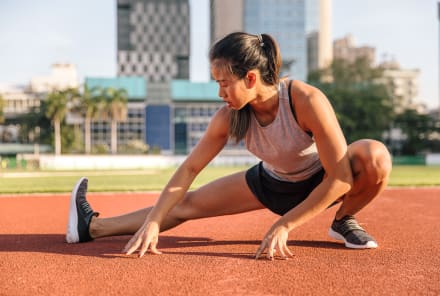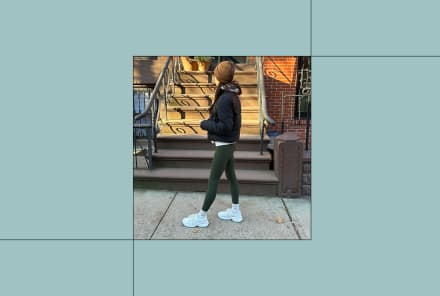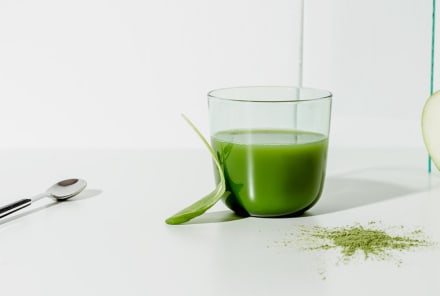Advertisement
In 2024, Fitness Clubs Will Become The New Social Clubs (And Everyone’s Invited)

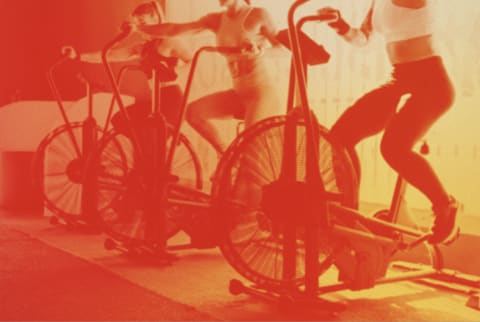
It’s the simplest things that have the biggest impact on our health. Take movement, for example, which is directly correlated with a longer lifespan1; or social connection, which has been linked with a 50% lower mortality risk2. What might happen if you combined these two longevity-boosting powerhouses together?
On a recent episode of the mindbodygreen podcast, psychologist David DeSteno, Ph.D. explained this concept. "When you engage in exercise, not only does it release endorphins—the chemical that is responsible for the runner's high—but it also releases endocannabinoids. These endocannabinoids socially bond people3."
In 2024 and beyond, we predict an upsurge in community-based fitness groups and organizations that allow people to reap these benefits of movement and connection together. Whether your passion is hiking, biking, pickleball, or running, it’s bound to be a gateway into deeper connection (and a longer life) in the year ahead.
Meet the experts
Jonathan Leary, DC
Jonathan Leary, DC is a doctor of chiropractic medicine and the founder and CEO of Remedy Place, the world’s first social wellness club dedicated to holistically bringing their guests back into balance.
Peter Athans, CSCS, CMPC
Peter Athans, CSCS, CMPC is a performance educator with over two decades of experience working at world-class learning and training institutions. He’s worked with athletes at the high school, Div I, and professional level and has also served Special Operators in the US Army as a Cognitive Enhancement Specialist.
Dino Malvone
Dino Malvone is the founder and CEO of SaltDrop, a fitness concept that warms the body and focuses the mind through beat-driven movement.
Carolyn Malloy
Carolyn Malloy is an endurance athlete who has completed 12 marathons and a triathlon. She is the founder of Hoboken Track Club, a racing-focused run club in New Jersey.
Benje Williams
Benje Williams is the cofounder of Outlandish, a hiking brand helping people reconnect with nature. He’s also a Public Voices Fellow on the Climate Crisis with Yale’s Program on Climate Change.
The ever-growing need for movement & connection
In recent years, many of us have experienced just how critical social connection is for our happiness and well-being. Not only can loneliness impact us emotionally, but it also wreaks havoc on the physical body. In fact, lacking social connection can be as deadly as smoking 15 cigarettes a day, according to a recent U.S. Surgeon General report4 on the loneliness epidemic.
Molly Maloof, M.D., emphasized this on a recent episode of the mindbodygreen podcast, sharing that “the fundamental truth is that we need social connection to thrive in this world5." And yet, a true sense of community is extremely difficult to find.
Jonathan Leary, DC, the CEO and founder of Remedy Place, recognized connection as an undervalued aspect of well-being, so he created a social wellness club in New York and Los Angeles to, well, remedy the issue. Remedy Place is a space for social self-care, with offerings such as hyperbaric oxygen chamber, infrared sauna, cryotherapy, lymphatic compression, ice baths, and IV drips.
When visiting the space myself, I’ve seen clients enjoying services with friends, coworkers, and even with a date (talk about a healthier way to build connection).
Now, for where movement comes in: It’s not groundbreaking news that movement makes us healthier. Even simple exercises such as walking can lower inflammation6, improve metabolic health7, and reduce your risk of developing cardiovascular disease8. And when starting new movement routines, it's only natural to want to do them with other people.
In his time coaching world-class athletes at West Point, Harvard, and with the New York Giants, Peter Athans, CSCS, CMPC, founder of Athans Performance Coaching, saw a common thread emerge.
“Humans do best when we are with and around others—and it feels good to work hard with someone else,” he tells mindbodygreen. “If you put a challenge or hard work into the equation, it’s a force multiplier. This pulls on two threads of the human condition: our desire for connection and our natural tendency to want to progress.”
Coaches, athletes, fitness instructors, and well-being enthusiasts are now acknowledging the inherent need for community—and, similar to what Leary created with Remedy Place, they're doing something about it.
Humans do best when we are with and around others—and it feels good to work hard with someone else.
"I personally feel that fitness isn't just about individual goals, but also about creating connections and a sense of belonging, all while moving together," says Dino Malvone, founder of New York City-based fitness club, SaltDrop, which sets itself apart from other workout studios with a deep focus on community and connection. Malvone regularly organizes social events at the studio and in local outdoor parks to help members support and motivate one another.
I've been to a few outdoor and countless indoor SaltDrop classes and I’m always impressed by the dozens of people who show up to move together when they could easily stream the same class from their living room (for less money, I might add).
"Moving together often offers motivation, support, variety, learning opportunities, a chance to see themselves in others, and can lead to more consistency in your movement practice," Malvone says. "Support and camaraderie are gateways to an extraordinary feeling."
The body-mind benefits of moving together
On the topic of community-focused exercise, DeSteno references research by Oxford professor Emma Cohen, Ph.D., which showed that synchronized warm-up sessions resulted in significantly better anaerobic performance9 than when the same rugby athletes warmed up alone.
"I think what we're finding in these classes is a way to use the body in a healthful way, not only to increase our own physical health, but to increase our connection and openness to each other and to something greater," DeSteno says.
I'm no stranger to the benefits of exercise, but this goes beyond that. Sure, you’re still showing up to improve your own health and well-being—but there's something about doing an activity you love surrounded by other people who feel the same affinity. This feeling of “spiritual ecstasy” (as DeSteno puts it) is what truly keeps me coming back for more.
It's that same draw that’s led me to join multiple running clubs in my adult life. These clubs provide a simple way to both build community and stay active. I've experienced this phenomenon time and time again, and I believe it's why I'm seeing more friends opt for group fitness activities over nights out—another trend we predict will only continue in the year ahead.
One such friend, Carolyn Malloy, joined her first running group in 2019 to train for her very first half marathon. Since then, she’s run countless races (including 12 full marathons and a triathlon) and even started a running club of her own, the Hoboken Track Club, which quickly grew to 80 active members and a total community of over 1,000 people.
“The most valuable thing about being part of the running community is the confidence I’ve gained to go after big goals, try new things, and just generally step outside of my comfort zone,” Molloy says. “Even if I fall short or don't find immediate success, I know my teammates are proud of me and will continue to support me.”
How the need for community will transform fitness in the year ahead
While running clubs are nothing new, we expect that more types of movement will receive the "club treatment" in the year ahead.
We're already seeing this shift starting. Walking has become a group activity, for example, with clubs—like my own local City Girls Who Walk—popping up in every city.
Brianna Joye Kohn started City Girls Who Walk in 2022 with a simple TikTok post rooted in the pure desire for fresh air, movement, and connection. To her surprise, she had about 250 people show up for that first walk in Central Park. The group has continued to grow since, with weekly walks attracting anywhere between 300 to 600 people. Now, Kohn also gathers the community for yoga, workout classes, happy hours, book clubs, and charity work.
Over in Los Angeles, Saturday Stairs took the simple concept of running stairs and hills and turned it into a community event. Every Saturday morning, the group meets at Hollywood Bowl for a free workout that’s attracted more than 3,000 community members on Instagram. Similarly, pickleball clubs are popping up across the country to welcome players of all levels for open play. New York City alone has at least 40 courts regularly packed with people reaping the sport’s longevity benefits.
As a member of many fitness communities, I particularly appreciate any that prioritize inclusivity. At SaltDrop, I love seeing diversity in every class; I look around and admire the fact that everyone looks different, yet we all belong. We predict (and hope) to see these spaces focus even more on inclusivity in the year to come.
Take Outlandish, for example, which was the first dedicated hiking store in Brooklyn and only the fourth Black-owned outdoor goods retailer in the United States. There’s been a clear lack of diversity in the outdoor recreation space, but Outlandish aims to change that by encouraging people of color (and all backgrounds) to reconnect with the outdoors. And community is at the heart of it all. The group saw over 550 RSVPs for its grand opening in 2023 and has since hosted dozens of hikes, trail runs, and training runs, often in collaboration with other brands, hiking groups, and run clubs. They’re even hosting a book club with Brooklyn-based Center for Fiction to explore authors of color who have written nature-based novels, further enhancing that true community feel.
“People are at the core of what we do,” emphasizes Benje Williams, who co-founded Outlandish with Brooklyn-born Ken Bernard. “For decades, there’s been stereotypes of these lone John Muir or Into the Wild characters pilgrimaging through the wilderness—and that’s one way to get out there—but I think society is rethinking how we can show up in nature, that it can also be a place we explore and enjoy together.”
Forecasting the future
Movement and social connection are each intrinsically tied to health and longevity, so it was only a matter of time before the two blended together. In the year to come, we’ll see all forms of fitness clubs being used as a pathway to connection with more people gravitating toward these spaces.
As fitness clubs become increasingly popular, we predict the majority of people will belong to at least one movement-focused community—and it won’t be so out of the norm to bring a date or a friend to a walking group or hiking club instead of meeting for drinks.
9 Sources
- https://www.nature.com/articles/s42003-022-03323-x
- https://journals.plos.org/plosmedicine/article?id=10.1371/journal.pmed.1000316
- https://www.ncbi.nlm.nih.gov/pmc/articles/PMC5699224/
- https://www.hhs.gov/sites/default/files/surgeon-general-social-connection-advisory.pdf
- https://www.annualreviews.org/doi/10.1146/annurev-psych-122216-011902
- https://www.ncbi.nlm.nih.gov/pmc/articles/PMC6497785/
- https://www.ncbi.nlm.nih.gov/pmc/articles/PMC6683051/
- https://pubmed.ncbi.nlm.nih.gov/30837069/
- https://www.ncbi.nlm.nih.gov/pmc/articles/PMC4552681/#pone.0136705.ref053
Watch Next
Enjoy some of our favorite clips from classes
Enjoy some of our favorite clips from classes
What Is Meditation?
Mindfulness/Spirituality | Light Watkins
Box Breathing
Mindfulness/Spirituality | Gwen Dittmar
What Breathwork Can Address
Mindfulness/Spirituality | Gwen Dittmar
The 8 Limbs of Yoga - What is Asana?
Yoga | Caley Alyssa
Two Standing Postures to Open Up Tight Hips
Yoga | Caley Alyssa
How Plants Can Optimize Athletic Performance
Nutrition | Rich Roll
What to Eat Before a Workout
Nutrition | Rich Roll
How Ayurveda Helps Us Navigate Modern Life
Nutrition | Sahara Rose
Messages About Love & Relationships
Love & Relationships | Esther Perel
Love Languages
Love & Relationships | Esther Perel

